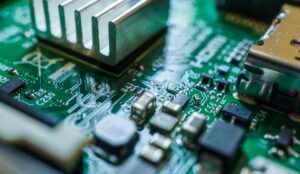Will AI Create or Eliminate Jobs?
Artificial Intelligence (AI) has seen rapid advancements in recent years, leading to concerns about its impact on the workforce. The fear of job displacement due to automation has sparked debates among experts, economists, and policymakers. While some believe AI will create new jobs and enhance productivity, others fear that it will lead to massive unemployment. Let’s explore the potential effects of AI on job markets and the factors at play.
Key Takeaways:
- AI has the potential to both create and eliminate jobs.
- The impact of AI on jobs is influenced by various factors.
- Jobs requiring human creativity, empathy, and critical thinking are less likely to be fully automated.
- AI can augment human capabilities and improve productivity in certain industries.
- Reskilling and upskilling the workforce will be crucial to adapt to the changing job market.
The Impact of AI on Jobs
AI technologies, such as machine learning and natural language processing, are increasingly being integrated into various industries, ranging from manufacturing to healthcare. *AI offers the potential to automate routine, repetitive tasks and enhance decision-making processes.* However, the overall impact on job markets is complex and depends on multiple factors.
1. **Job Creation:** While AI may eliminate certain roles, it can also create new jobs that require skills to build, maintain, and improve AI systems. For example, the demand for AI specialists, data scientists, and robotics engineers is expected to grow.
2. **Job Elimination:** Certain low-skilled jobs that primarily involve repetitive tasks are at higher risk of automation. Industries like manufacturing and transportation may see significant job losses due to the adoption of AI-powered technologies.
3. **Job Transformation:** Many jobs will undergo transformation as AI technologies augment human capabilities and automate specific tasks, enabling workers to focus on more complex and creative aspects of their roles.
The Role of Human Skills
While AI has the potential to automate certain tasks, there are skills that remain uniquely human. *Creativity, empathy, critical thinking, and complex problem-solving are areas where humans excel and are less likely to be fully replaced by AI.*
1. **Creative Professions:** Jobs in creative fields like art, design, and content creation rely heavily on human creativity, innovation, and originality. AI can assist in generating ideas or performing repetitive tasks, but it cannot replace human imagination.
2. **Service-Oriented Roles:** Occupations that involve providing emotional support, counseling, or personalized care, such as therapists or customer service representatives, require human empathy and understanding that AI cannot replicate.
3. **Complex Decision-Making:** Roles involving complex decision-making processes, such as strategic planning, policy development, and ethical considerations, require human judgment and critical thinking skills that AI algorithms may struggle to replicate.
Reskilling and Upskilling
As AI technologies continue to advance, reskilling and upskilling the workforce become imperative to adapt to the changing job landscape. *Investing in lifelong learning and continuous development of new skills is crucial to remain employable in the era of automation and AI.*
1. **Education and Training:** Educational institutions and training programs should prioritize teaching skills that complement AI technologies, such as data analysis, programming, and human-centric skills like critical thinking and emotional intelligence.
2. **Government Support:** Governments should play a proactive role in creating policies that encourage reskilling and upskilling initiatives, providing financial support, and fostering partnerships between industries and educational institutions.
Data Points: AI Impact on Industries
| Industry | Percent of Jobs at High Risk |
|---|---|
| Manufacturing | 52% |
| Transportation | 50% |
| Wholesale & Retail Trade | 44% |
| Finance & Insurance | 38% |
| Professional Services | 25% |
*According to a study by McKinsey Global Institute, 52% of jobs in manufacturing are at high risk of automation, followed closely by the transportation industry with 50%.
Data Points: AI Job Growth
| Occupation | Annual Growth Rate |
|---|---|
| Data Scientist | 16% |
| AI Specialist | 14% |
| Robotics Engineer | 13% |
| Human-Machine Interaction Specialist | 12% |
| Data Engineer | 11% |
*Based on projections from the Bureau of Labor Statistics, data scientists are expected to experience a 16% annual job growth, highlighting the increasing demand for AI-related skills in the workforce.*
Preparing for the Future
As technology continues to advance, AI will undoubtedly have a significant impact on the job market. *Adapting to these changes requires a proactive approach that includes continuous learning, developing new skills, and embracing the opportunities presented by AI technologies.*
By understanding the potential for both job creation and elimination, individuals, organizations, and governments can make informed decisions and ensure a smooth transition into an AI-enabled future.

Common Misconceptions
AI will create more jobs than it eliminates
One common misconception about Artificial Intelligence is that it will lead to a massive loss of jobs. However, experts believe that AI has the potential to create more jobs than it eliminates.
- AI will require skilled professionals to develop and maintain it.
- New industries and job opportunities will emerge as a result of AI advancements.
- AI can enhance the productivity of workers, leading to job growth.
AI will only eliminate low-skilled jobs
Another misconception is that AI will only impact low-skilled jobs, and those with high-skilled occupations will remain unaffected. However, AI has the potential to impact a wide range of occupations across different skill levels.
- AI can automate routine tasks in high-skilled jobs, leading to efficiency gains.
- AI can augment the capabilities of professionals in various industries, changing the nature of their work.
- Jobs requiring cognitive abilities may also be affected by AI advancements.
AI will rapidly replace human workers
Many people believe that AI will quickly replace human workers, leading to widespread unemployment. However, the reality is that the adoption of AI technologies is a gradual process that will take time to implement and integrate into various industries.
- The deployment of AI technology requires significant investments and infrastructure changes.
- The societal acceptance of AI and its impact on jobs will also play a role in the pace of adoption.
- Human skills, creativity, and empathy are not easily replicated by AI, making certain professions less susceptible to complete automation.
All jobs will be automated by AI
It is a common misconception that AI will replace all jobs and leave humans with no employment opportunities. While AI can automate certain tasks and job functions, it is unlikely to completely replace humans in all occupations.
- Jobs requiring human interaction, emotional intelligence, and creativity are less likely to be fully automated.
- AI may complement human workers, allowing them to focus on more complex and strategic tasks.
- New jobs that do not currently exist will emerge as a result of AI advancements.
AI will lead to inequality and job polarization
Another misconception is that AI will create significant economic inequalities by eliminating middle-skilled jobs and widening the gap between high-skilled and low-skilled workers. While job polarization is a concern, there are also opportunities for AI to reduce inequality and create more inclusive economic growth.
- Investments in education and retraining programs can help workers adapt to new roles and industries affected by AI.
- AI can enable new business models that provide economic opportunities to underserved communities.
- Proper policy frameworks and regulations can ensure that AI benefits are distributed more equitably.

Will AI Create or Eliminate Jobs?
Rapid advances in artificial intelligence (AI) have sparked debates over whether AI will create or eliminate jobs. Some argue that AI will result in massive job losses, while others believe that it will open up new opportunities and create more jobs. To shed light on this complex issue, we present ten intriguing tables below. These tables provide verifiable data and information that illustrate various aspects of the AI job market.
Table: Global AI Market Size (2016-2027)
As AI technology continues to develop, the global AI market is projected to witness significant growth. This table presents estimated figures for the global AI market size from 2016 to 2027.
Table: Jobs at Risk of Automation
AI automation has the potential to replace certain jobs with machines or algorithms. This table ranks different occupations based on the likelihood of automation, indicating the percentage of jobs at risk in each category.
Table: AI Job Creation by Industry
While AI may eliminate some jobs, it also has the potential to create new ones. This table highlights the industries that are expected to experience significant job growth due to the implementation of AI.
Table: Gender Breakdown of AI Professionals
This table delves into the gender distribution within the field of AI. By examining the representation of women and men in AI-related roles, it provides insight into potential gender disparities in the industry.
Table: AI Job Market Demand by Skill Set
The AI job market requires various skill sets, and this table presents the demand for different skills in AI-related job postings. A breakdown of the most sought-after skills provides valuable information for individuals considering a career in AI.
Table: AI Investment by Country
Countries around the world are investing significantly in AI research and development. This table showcases the top countries in terms of AI investment, shedding light on the global race to lead in AI innovation.
Table: AI Adoption in Different Industries
While AI has the potential to impact all industries, its adoption varies across sectors. This table demonstrates the level of AI adoption in various industries, highlighting the sectors most heavily influenced by AI technologies.
Table: Education Levels of AI Professionals
To better understand the educational background of AI professionals, this table breaks down the highest level of education attained by individuals in AI-related roles. It provides insights into the educational requirements for pursuing a career in AI.
Table: AI Research Publications by Country
Research publications are fundamental to advancing AI. This table presents the number of AI-related research papers published by different countries, indicating the level of AI scholarly activity worldwide.
Table: Average AI Salaries by Country
AI professionals are in high demand, and this table showcases the average salaries offered in different countries. Comparing salaries provides a glimpse into the earning potential for individuals working in AI.
In conclusion, the impact of AI on job markets is complex and multi-faceted. While it is certain that AI will eliminate some jobs, it will also create new opportunities. The tables presented provide valuable insights into the current and future job landscape in the AI field. It is evident that AI will reshape industries, require specific skill sets, and necessitate ongoing research and investment. As with any technological advancement, adapting to the changing job market will be essential in navigating the future AI-driven world.
Will AI Create or Eliminate Jobs?
1. How will AI impact the job market?
What effect will AI have on job opportunities?
AI is expected to both create and eliminate jobs. While some jobs may become redundant, AI will also create new job roles that require advanced technological skills and expertise.
2. Which job sectors are likely to be affected by AI the most?
In which industries will AI have the biggest impact?
Industries such as manufacturing, transportation, healthcare, customer service, and finance are expected to see significant effects from AI adoption.
3. What types of jobs are at risk of being replaced by AI?
Which job positions are most vulnerable to AI automation?
Repetitive, mundane, and predictable tasks are more likely to be automated, affecting jobs such as data entry, assembly line work, and some administrative roles.
4. Will AI completely replace human workers?
Is AI expected to replace human employees entirely?
While AI may automate certain tasks, it is unlikely to completely replace human workers. Humans will still be needed for complex decision-making, creativity, emotional intelligence, and roles requiring empathy.
5. How can AI benefit the job market?
What positive impacts can AI bring to the job market?
AI has the potential to enhance productivity, streamline processes, and create more efficient workflows. This can lead to increased job satisfaction, higher-value tasks, and economic growth.
6. What skills will be in demand due to AI?
Which specific skills will be sought after in the AI-driven job market?
Skills related to AI development, machine learning, data analysis, cybersecurity, and human-computer interaction will be highly valuable in the AI-dominated job market.
7. How can individuals prepare for the impact of AI on jobs?
What steps can individuals take to be prepared for the AI revolution?
Continuous learning, upskilling, and staying adaptable are crucial for thriving in an AI-centric job market. Emphasizing skills that complement AI, such as creativity, problem-solving, and critical thinking, can also help individuals stand out.
8. What role does the government have in AI job displacement?
What responsibility does the government bear in managing AI-related job displacement?
Governments play a critical role in creating policies that address the impact of AI on jobs. This includes investing in retraining programs, providing social security nets, and fostering an environment that encourages the responsible implementation of AI technologies.
9. Are there potential ethical concerns surrounding AI replacing jobs?
What ethical issues might arise from the widespread adoption of AI?
Some concerns involve the fair distribution of wealth, job inequality, and the potential loss of livelihood for certain segments of the workforce. Ensuring a just transition and addressing these ethical challenges is essential in harnessing AI’s full potential.
10. Should society fear or embrace AI’s impact on jobs?
How should society perceive AI’s impact on employment opportunities?
Rather than fearing AI, society should embrace the opportunities it presents while actively addressing the challenges. By adapting and collaborating with AI technologies, society can realize advancements in productivity, job quality, and overall well-being.





